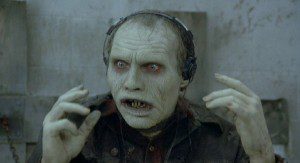The Monster Spreads Debt

From George Romero’s “Day of the Dead.”
I’ve been thinking about the entertainment world’s fascination with zombies, and wondering what it means. It’s long been said that the first zombie film was really about shopping and consumerism. No surprise, then, that zombies are going global just as “the American way of life” makes its way around the world.
Since 2007, however, I have wondered whether the principal export of the United States hasn’t been “financial instruments.” I’m talking about personal financial debt.
Since I got out of college, someone has tried to convince me I need to go into debt to support the middle-class lifestyle I once took for granted. Someone was constantly trying to get me to take a credit card, a home loan, or borrow money for a new car.
They were working against the will of my Depression-era Republican father. He taught me to avoid debt, if I could, assuring me that having too much of it would make me poor. For most people, this is true.
For those with means, on the other hand, greater debt has come to be counted as wealth or, at least, as being “necessary for success.” This is becoming more true, even ten years after US banks packaged, sold and re-sold raw “bad” housing debt to US borrowers and the world, crashing the global economy.
Further, US poverty is growing because of the parallel decades-long Republican campaign to reduce government services — forcing American workers to pay for their own health care, childcare/education, their own pensions, even for their own work, when they can get it. More Americans are expected to find their own “hand up” when low-paying work or no-work is all there is. Forcing more of us into the bizarre, no-future “productivity” of Trumpland — more personal debt.
In Donald Trump, we have seen the rise of an unapologetic “financial outlaw” as the model of how this new, strange America has worked (for him): More private debt is now a good thing, but you really need to become “too big to fail,” and have the “muscle” to declare your complete lack of intention to play by the rules and pay it back. The borrowing employer-class “hero” can cheat people on both sides — sell the unwitting buyer his university diploma or new house (neither of any certain long-term value) — then sell off his bad bets (“assets” to him) to more unwitting investors down the road, in Delaware, Calcutta, or Mannheim. Or, to now-weakened regulators in Washington.
Perhaps the financial outlaw’s real victimized “mark” is the US government itself. After all, when the whole thing breaks, the media and Congress can assure everyone that those at the middle and bottom don’t have “taker” rights — that they will remain walled-off in the land of the “walking dead” — refugees in their own country — having no resources of much interest to today’s banking class.
Our current “zombie” system makes sure, on the other hand, that the guilty get their “fair” air-time for their endless “lower taxes and cut government spending” moaning. All justification for rewarding themselves with more tax breaks and subsidies, convincing everyone to admire their huge unpaid loans as wealth; that their capital losses are community “sacrifices” and that their own royal, entertainment lifestyle is the best-possible contribution they can make to society. “Gee, thanks, keepers of the gates!”
More than anyone else today, Donald Trump reminds me of the real-life coal operator-politicians of the past century, embodied as “Sheriff Riley Gore,” in my novel, Carla Rising.
Trump and Riley Gore (named for a real deputy of 100 years ago) have too many counterparts: Executive-class politicians who come to us, offering industrial growth and jobs — but who usually end up establishing what historians call “captive communities,” — work camps where one family, alone, gets rich by passing the biggest social and business risks — including financial debt, legal compromising, and other human and environmental degradation — down to their own employees.
One of the things that has made American journalism increasingly difficult these past 25 years, is this: It is harder to tell any story of organizational or systemic corruption as being something different than “business as usual.” This is why I’ve moved into fiction.
I’m 90% sure that Donald Trump will not be the next American president. He may even be held responsible, in some way, for his bad business practices or immoral behavior.
But, eventually, we will realize that he was just a high-profile symptom of a long, historical problem in the United States. Call it a “winner take all” economy that rewards “bad guys” too often and makes the rest of us — those trying to work with integrity — feel like fools. This is the new “Trumpland” Zombie-making business model in the United States, and is corrupting all its industries, including entertainment and communications. Insofar as we defend this corruption — and if too many others buy it — it could continue to create subsidiary oligarchies, changing the world for the worse.
I wrote Carla Rising to address this problem. I hope the country can walk into 2017 not as “zombies,” but ready to talk about regulating the economy (top to bottom) so that big, “entitled” bad guys don’t win, decade after decade.
